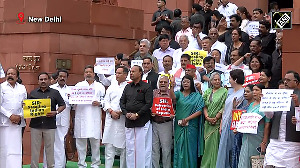The biggest question looming over the summit is whether there will be a joint leaders' declaration in view of the sharp differences between the West and the Russia-China combine on the text to describe the Ukraine conflict in the document.

India is set to make a dash for a goal line at the two-day G20 summit beginning Saturday in addressing some of the complex global challenges such as concerns of the Global South, consequences of the Ukraine conflict, gloomy economic scenario, and fostering inclusive growth amid a fragmented geopolitical environment.
Prime Minister Narendra Modi, United States President Joe Biden, German Chancellor Olaf Scholz, French President Emmanuel Macron and other leaders of the G20 grouping as well as chiefs of many leading world bodies like the International Monetary Fund, World Bank and Organisation for Economic Co-operation and Development (OECD) are converging in the national capital for the summit.
It is for the first time that India is hosting the annual summit of the G20 and New Delhi has pulled out all the stops in rolling out a grand welcome to the leaders and making the summit a success.
The city has also undergone a major makeover to host such a high-profile event in decades.
However, the biggest question looming over the summit is whether there will be a joint leaders' declaration in view of the sharp differences between the West and the Russia-China combine on the text to describe the Ukraine conflict in the document.
No consensus has been achieved yet on the contentious issue and top negotiators are still holding hectic parleys to thrash out the differences.
The G20 operates under the principle of consensus and lack of a common view may result in the summit ending without the declaration.
The silver lining for India's presidency is likely to be support by almost all G20 countries to its proposal to include the African Union as a permanent member of the bloc that has emerged as perhaps the most influential multilateral forum after the United Nations.
In the last few years, India has been positioning itself as a leading voice, flagging concerns, challenges and aspirations of the Global South or the developing nations, especially the African continent.
The prime minister has been leading from the front on the issue of the African Union's membership of the G20.
In June, Modi wrote to the G20 leaders, pitching for according the African Union the full membership of the grouping at its New Delhi summit.
"The European Union is looking forward to welcoming the African Union as a permanent member of the G20," President of European Council Charles Michel said on Friday, indicating consensus on the proposal.
The African Union (AU) is a significant organisation comprising 55 member states that make up the countries of the African continent.
Some of the key issues facing the G20 summit are reshaping international debt architecture, offering loans to developing nations, having some kind of regulatory framework for cryptocurrency and artificial intelligence.
"There is a growing understanding that many of the solutions that the world needs are already being successfully implemented in our country, with speed and scale," Prime Minister Modi told PTI in a recent interview.
"Many positive impacts are coming out of India's G20 presidency. Some of them are very close to my heart," he said.
Officials indicated that there would be a positive outcome at the summit on some of the pressing issues facing the world.
There is an expectation of positive outcomes for India's proposals on issues such as digital public infrastructure, climate finance, sustainable development and clean energy.
India's G20 presidency has marked a significant milestone in its global leadership role as it steered discussions among the world's major economies in dealing with complex global challenges.
As the G20 president, India has been focusing on issues like inclusive growth, digital innovation, climate resilience, and equitable global health access.
By leveraging its presidency, India is fostering collaborative solutions that not only benefit its own population but contribute to the broader global well-being, reinforcing its spirit of 'Vasudhaiva Kutumbakam' or the 'World is One Family'.
Besides the G20 member nations, India has invited leaders of Bangladesh, Egypt, Mauritius, the United Arab Emirates, Spain, Singapore, Oman, Nigeria and the Netherlands.
After assuming the presidency of the bloc on December 1, 2022, India held around 200 meetings related to G20 across the country on a range of its priority areas.
The G20 member countries represent around 85 percent of the global GDP, over 75 per cent of the global trade, and about two-thirds of the world population.
The grouping comprises Argentina, Australia, Brazil, Canada, China, France, Germany, India, Indonesia, Italy, Japan, the Republic of Korea, Mexico, Russia, Saudi Arabia, South Africa, Turkey, the UK, the US and the European Union (EU).











